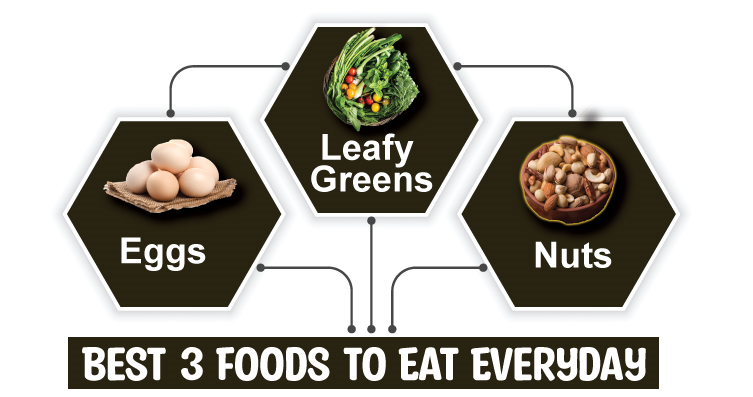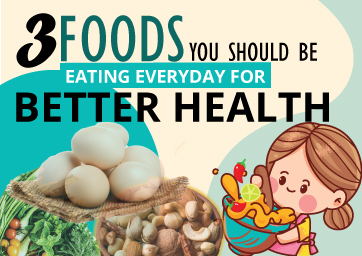What are 3 Foods to Eat Everyday?
There are lots of options when it comes to healthy things to eat. But some food is an automatic pick. These nutritious options should become staples in your diet, not just once-in-awhile treats.

1. Leafy Greens
Leafy greens are often overlooked as a food source, but they have a wide array of vitamins and nutrients that make them a great addition to any meal. People who eat leafy green vegetables tend to live longer and healthier.
Leafy greens include lettuce, spinach, kale, collard, turnip greens, watercress, etc. They are the healthiest foods and have been shown to reduce inflammation and lower cholesterol levels.
Also, these leafy greens are some of the easiest vegetables to grow indoors. All you need is sunlight and a little bit of space. Most of these greens grow well in low-light environments.
Nutritional Value
Leafy greens contain vitamins A, C, K, and B-complex. They also contain folate, iron, zinc, copper, manganese, vitamin D, vitamin E, omega-3 fatty acids, fiber, antioxidants, and anti-inflammatory compounds.
2. Eggs
Eggs are the foods to eat regularly. They are loaded with protein and have many uses. Enjoy them scrambled, boiled, fried, or poached. Eggs have been shown to help lower blood pressure and cholesterol levels and reduce the risk of heart disease.
Nutritionalonal Value
Whole eggs are the best option for nutrition. They are high in protein, low in cholesterol, and rich in vitamins and minerals. One whole egg provides approximately 6 grams of protein and 5 milligrams of omega-3 fatty acid.
And eggshells are edible too. The shells of eggs provide many different nutrients, including calcium, phosphorous, magnesium, iron, zinc, copper, manganese, selenium, and sulfur. These elements are necessary for proper bone formation, muscle contraction, and nerve function. An eggshell contains about 30% protein, 20% fat, 50% water, and 8% ash.
3. Nuts
Nuts are seeds that have been covered in a hard shell. To eat a nut, you must remove the shell. Nuts are high in protein and fat content, making them perfect for people looking for healthy foods to eat every day. Nuts reduce cholesterol levels, aid weight loss, and lower blood pressure. Healthy nuts include almonds, cashews, hazelnuts, peanuts, pecans, pistachios, walnuts, and chestnuts.
Nutritionalrional Value
Nuts are packed with fiber and contain many vitamins and minerals, including copper, manganese, magnesium, and zinc.
Nuts are also excellent sources of vitamins B and E. Nuts are rich in antioxidants and omega-3 fatty acids. Besides, nuts have monounsaturated fats that help lower bad cholesterol and increase good cholesterol.
How to Include them in a Regular Diet?
Here are some tips to help incorporate leafy greens, eggs, and nuts into your day:
● Leafy Greens
➢ Add spinach to pasta dishes, soups, salads, sandwiches, wraps, and burgers.
➢ Steam kale and collard greens for 15 minutes before adding to stir-fries, omelets, and rice bowls.
➢ Chop Swiss chard and use it as a bed for grilled meats.
➢ Combine kale and cabbage for a hearty soup.
➢ Blend spinach, parsley, and mint together for a flavorful smoothie
● Eggs
➢ Egg whites can be added to smoothies, oatmeal, salads, sandwiches, etc.
➢ You can cook them with veggies or bake them into muffins.
➢ You can add some to pasta dishes, casseroles, soups, etc.
➢ You can also make a breakfast quiche from eggs, cheese, and veggies.
● Nuts
➢ You can add different types of nuts to salads. You can even combine several types of nuts.
➢ Sprinkling nuts on oatmeal is a great way to get more fiber and nutrition into your diet.
➢ You can mix nuts into your smoothie to increase their nutritional value.
➢ You can roast and grind nuts at home to create healthier snack options.
➢ Adding nuts to baked goods adds flavor and texture without adding unwanted calories.
How Much Protein and Vitamins Should be Consumed in A Day?
Protein is an essential part of a diet, especially for vegetarians and vegans who do not consume meat. Proteins provide necessary structure and function to our bodies; without them, we would not be able to live.
The recommended daily allowance (RDA) of protein varies depending on age, gender, and physical activity level.
● For adults aged 19–50, the RDA ranges from 0.8 grams per kilogram body weight to 1.0 grams per kilogram of body weight.
● For men over 50 years old, the RDI is 0.9 grams per kilogram of body weight.
● Women over 50 years old should have 0.8 grams per kg body weight.
● Children ages 2–18 years old require 0.8 grams per kilogram.
Vitamins are essential for human nutrition and are present in almost all foods. However, some people may suffer from vitamin deficiencies due to poor diet and lifestyle choices. You should know how much protein and vitamins you need to eat to stay healthy. Here's a complete guide you should read to learn about RDA for Vitamin.

Best Source of Protein for Daily Intake
Here's a list of the best foods to eat to meet your daily protein needs:
1. Brown Rice
Brown rice is rich in protein and contains less fat than white rice. Also, brown rice is high in fiber, vitamins, and minerals.
2. Beans
Beans are packed with protein and vitamins. You can make them into soups, salads, and even dips!
3. Tofu
Tofu is full of protein and low in calories. Add tofu to any meal and enjoy its versatility.
4. Lentils
Lentils are great for vegetarians who want their protein fixed without meat. They're also relatively cheap and easy to prepare.
5. Milk
Milk is full of protein and calcium. Try making some milk shakes or use them in baked goods.
Eating Habits for a Better Healthy LifeStyle
Now that you know the foods you should eat every day, you surely would want to get the best out of your protein and vitamin intake. To do so, you need to have healthy eating habits.
Here are some tips on how to eat healthy and stay healthy.
● Eat breakfast: It sets the tone for your entire day. Eating a good breakfast will help keep you energized throughout the day.
● Don't skip meals: Skipping meals will leave you tired and hungry, making it difficult to concentrate and perform well at school or work.
● Eat plenty of fruits and vegetables: They provide the body with vitamins, minerals, antioxidants, fiber, and water. These foods help keep your immune system strong and ward off disease. Fruits and veggies also give you the energy you need throughout the day.
● Drink lots of water: It removes toxins from your system, keeps you hydrated, and ensures your organs function properly. Try to drink at least eight glasses of water per day.
● Avoid processed food: They are full of preservatives, additives, and chemicals. These foods often lack nutritional value and can cause damage to your body. Stay away from fast food, refined sugar, and packaged snacks.
● Make good choices: Eat healthy whole foods instead of junk food. Choose lean meats, fish, nuts, seeds, beans, and tofu over red meat, butter, cheese, and cream. Limit sugary drinks and alcohol.
● Get enough sleep: It is critical to your mental and physical well-being. Less than seven hours of sleep per night puts you at risk for weight gain and depression.
● Get some exercise: It keeps you fit and energetic. Try to work out for 30 minutes at least four times per week. Exercise burns calories and releases endorphins, those feel-good hormones. Endorphins make you happy!
Final Words
So now you know all about the three foods to eat every day. We hope that you will add these foods to your diet immediately.
We have a list of blogs you can read to learn more about the healthiest food types for people with diabetes, kidney issues, blood pressure, and more. And if you feel like talking to a nutritionist. Use our platform to connect to top-rated nutritionists nearby now.



 Contact Us
Contact Us






 Hospitals
Hospitals
 Doctors
Doctors
 Diagnostic
Diagnostic
 Pharmacy
Pharmacy
 Health Tips
Health Tips
 Blog
Blog



















Comments